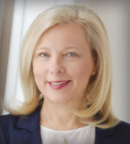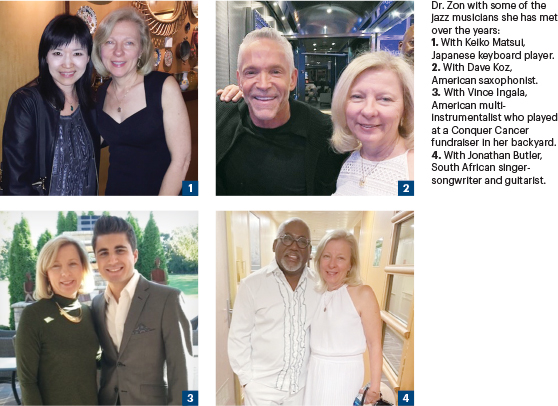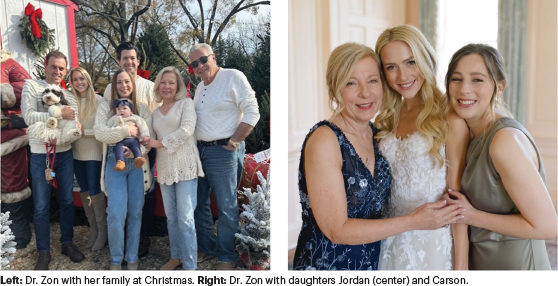ASCO President for the 2024–2025 term, Robin Zon, MD, FACP, FASCO, was born and reared in Cheektowaga, a town in the western part of New York. “Cheektowaga is the Native American name for ‘land of the crabapple tree.’ Western New York was first settled by one of seven tribes belonging to the Iroquois nation, and there were several Native American reservations in our area. In addition, we lived across the border from Canada. All in all, it was a great place to grow up,” shared Dr. Zon.
ROBIN ZON, MD, FACP, FASCO

TITLE
Director of Breast Oncology, Cincinnati Cancer Advisors, and ASCO President for the 2024–2025 term
MEDICAL DEGREE
Indiana University School of Medicine, Indianapolis
ON THE HOOSIER ONCOLOGY GROUP
“Affectionately called the HOG, it was this beautiful partnership of co-chair leadership: Dr. Pat Loehrer was on the academic side, and Dr. William Fisher was on the community side. The HOG was a model representing the dynamics of how a partnership between academic and community doctors could propel clinical research to answer pragmatic questions regarding the care of patients. This exposure was a major influence on my career trajectory.”
A Speaker’s Influence
Asked about people who may have influenced her desire to pursue a career in medicine, Dr. Zon replied: “There are no doctors in my family. However, there was a lot of cancer. In fact, my father’s mother died of breast cancer when she was in her 40s, and my dear grandfather suffered from [superior vena cava] syndrome, so I understood and witnessed the dire medical circumstances of cancer and how it affected so many people.”
Dr. Zon continued: “In 1969, while in middle school, a speaker for our school assembly talked about the dangers of smoking. As part of his presentation, he had pictures of the liver and the lungs full of cancer, which I found fascinating and at the same time mysterious. This event was following the surgeon general’s warning, at a time when the national antismoking campaign was kicking off. That evening, I went home and explained to my father, who was a chain smoker, why I did not want him to smoke in front of my brother and myself. Although he continued smoking, from that day on, he never smoked in front of us. I repeated the same message and request with my grandparents who were also smokers, with the same result. It was interesting because who would have known that my strength in advocacy was rooted in this experience. I was advocating for myself and my brother, based on what we now refer to as evidence-based learning.”
‘The War on Cancer’
According to Dr. Zon, when President Richard Nixon signed the National Cancer Act of 1971, it sealed her percolating desire to pursue a career linked to cancer. “I remember as clear as day, I was watching the news about this groundbreaking bill, referred to as The War on Cancer, and it just connected all the dots for me. The antismoking lecture in primary school, cancer in our family, and the President’s announcement planted the seed, and I never looked back,” she remembered.
Dr. Zon continued: “I also had very good science and math teachers throughout middle and high school who exposed me to opportunities most kids did not have. Although recruitment to the field of oncology is often directed to students in college and medical school, unfortunately by that time, we have lost a lot of kids who may have had medicine in the back of their minds. This is where middle and junior high school STEM [Science, Technology, Engineering, and Math] programs come into play, to capture and excite kids about science and medicine during their formative years.”
Co-op Program Leads to Opportunity
Dr. Zon was encouraged by her high school science teacher to do her premed work in chemistry. “I chose the University of Detroit because it was one of the first colleges in the United States that had what’s now called a co-op program. We would alternate a semester at the university with a semester working in industry.”

Dr. Zon shared some memories of her experience with Dow Chemical during college. “My first professional mentor was a woman who was one of the few female engineers in the company, and also a strong advocate for women having both a professional life and children,” she related. “Although my goal was to become a physician, the professionals at Dow encouraged me to stay in industry for a while. Their rationale was that I would develop research and project management skills, which would lead to pharmaceutical development. They were very forward-looking, predicting that health care was going to be increasingly influenced by business decisions. The exposure to Dow Chemical and their subsidiaries was a transformative experience for me.”
A Stint in Industry
After attaining her BS in chemistry from the University of Detroit, Dr. Zon delayed her decision to go to medical school for a “brief career in industry,” working in a lab at Dow Pharmaceuticals under the mentorship of Linda Meyers, PhD. “Linda developed breast cancer and died within 2 years of her diagnosis; she was in her early 40s. During her cancer treatments, Linda often had me take over her lab and lead her projects. She had encouraged me to go to medical school, as did Dr. Klaus Pullman, another mentor at Boehringer Mannheim, which is where I worked subsequently,” she said.
Dr. Zon followed her original passion and attended the Indiana University Medical School. There, she had the opportunity to be influenced by some of the giants in oncology, such as Drs. Larry Einhorn, Bruce Roth, Craig Nichols, Pat Loehrer, and George Sledge, whom she credits with her decision to become a medical oncologist. “I had my first daughter 6 months before graduating from medical school,” Dr. Zon explained. “So, I started my residency at St. Vincent’s Hospital and Health Services when she was 6 months old.”
According to Dr. Zon, the residency program was where her leadership development occurred, under Dr. Robbie Robinson, who was Residency Director at St. Vincent’s. “I was an older student and had experience, so he encouraged and promoted my leadership development. At that time, the American College of Physicians [ACP] had a Residence Council, which selected residents from different disciplines to serve on an advisory panel. We would periodically meet and interact with ACP leadership to offer suggestions for improving our training experiences,” stated Dr. Zon.
Return to Indiana and Joining ASCO
After residency, Dr. Zon returned to Indiana for her fellowship at Indiana University Cancer Center, noting Drs. Lawrence Einhorn, Pat Loehrer, and George Sledge as special mentors. “During fellowship, we were exposed to the Hoosier Oncology Group, affectionately called the HOG,” she continued. “It was this beautiful partnership of co-chair leadership: Dr. Pat Loehrer was on the academic side, and Dr. William Fisher was on the community side. The HOG was a model representing the dynamics of how a partnership between academic and community doctors could propel clinical research to answer pragmatic questions regarding the care of patients. This exposure was a major influence on my career trajectory.”
Dr. Zon continued: “At Michiana Hematology Oncology (MHO) in Mishawaka, Indiana, where I pursued community medical oncology after fellowship, we formed a consortium that became an NCI designated Community Clinical Oncology Program (CCOP). During the 14 years in the CCOP leadership, I was an associate principal investigator for 4 years and the main principal investigator for 10 years. Our program became one of the top 10 performing CCOPs with enrollment of up to 400 to 600 people a year. Our clinical trials included those in prevention, quality of life, and cancer treatments; and our success was because of working with surgeons, other multidisciplinary care team members, a patient council, and local hidden healers. Critical to our success, was the leadership of Dr. Lori Minasian and the late Dr. Worta McCaskill-Stevens, who were powerful mentors and role models.”
In 1997, Dr. Zon joined ASCO—it was the first year that fellows were eligible to become members—and she soon became immersed in the collaborative culture. “I was assigned to a number of ASCO committees,” she related. “Eventually, I was on the Board of Directors and co-chaired several task forces, but I had many mentors, such as Drs. Rich Schilsky and Allen Lichter. I am grateful for all my mentors and role models, both from academia and the community setting. ASCO also had strong female leaders, such as Drs. Sandra Swain, Julie Vose, Monica Bertagnolli, Lori Pierce, and Jamie Von Roenn; whether they knew it or not, they were mentors and role models for me. And from the community side, there were Drs. Alan Lyss , Ray Page, Barbara McAneny, who eventually became President of the American Medical Association, and Sibel Blau, who is Chief Executive Officer of the Quality Cancer Care Alliance Network.”
Asked to briefly describe her current work, Dr. Zon replied: “I was with MHO full time until about 2 years ago and became a physician emeritus. I also joined Cincinnati Cancer Advisors, which is a not-for-profit organization, an initiative developed by Dr. William Barrett, who is a radiation oncologist at the University of Cincinnati. In short, we review patient records and offer free-of-charge second-opinion consultations. These consults provide prolonged, non-rushed discussions to help patients better understand their circumstances. Patients then return to their oncology team for ongoing care. It’s extremely rewarding work.”
ASCO President: 2024–2025
Asked for a brief reflection on becoming the 2024–2025 ASCO President, Dr. Zon shared these comments: “This is an incredible honor. I hope to bring my experiences to the table and share, as well as learn from others as we, as an organization, continue to galvanize progress. I’ve already had the opportunity to go to several state affiliate meetings and speak with several people worldwide. It is truly amazing to witness what’s out there in terms of the talent, how cancer care is being delivered, to see the unexpected, and observe how people make it work. The heart and spirit of the people in the worldwide oncology community cannot be surpassed and are critical to the future betterment of cancer care.”
Advice for Medical Students
When Dr. Zon was asked whether she had advice for young medical students considering a career in oncology, she replied: “First and foremost, from my personal experience, oncology is the best job in medicine. It is powerful, inspirational, and yet a humble calling. Because of the rapid changes, with ongoing discovery surrounding oncology and precision medicine, we’re now curing diseases and having long-term survivors, which wasn’t happening when I began my career.”

Dr. Zon continued: “An oncology career is more than science and clinical care. There are extras we get to do as cancer doctors. We can use our voice and help patients with advocacy, for example. In addition to being advocates for patients every day, we can participate in life-changing research for patients with cancer.”
Outside of Work
How does a busy oncology leader wind down? “I utilize good nutrition and exercise as a priority in winding down—sort of a practice-what-I-preach lesson,” Dr. Zon noted. She added: “As my children were growing up, I wanted to be present and became a soccer mom, and my husband was a soccer dad, as well as a coach. Our daughters were quite good players, so we were able to travel the world, which was so much fun. In addition, I have been a huge fan of jazz since I was about 16. My goal is to see as many countries as I can in my life, through the eyes of jazz. So far, I’ve visited about 20-plus countries, always seeking out jazz events.”

